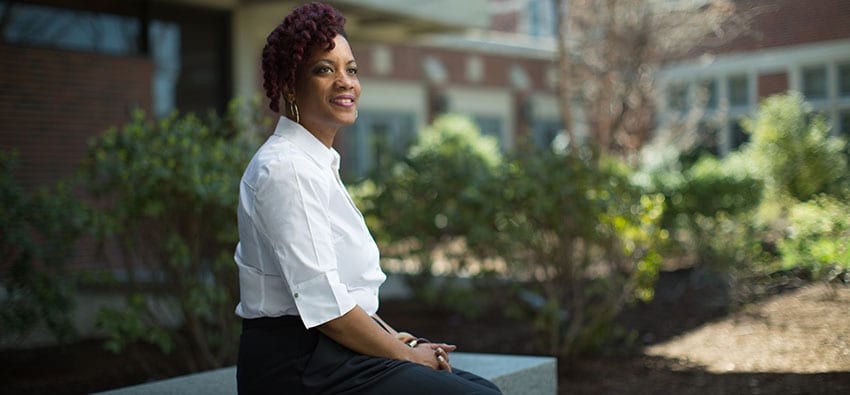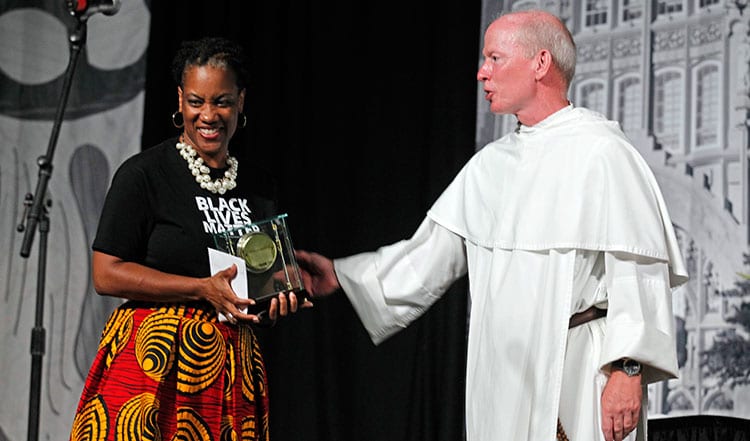Student identity, success at core of Dr. Julia Jordan-Zachery’s teaching

By Vicki-Ann Downing
Helping students understand their cultural and racial identities is central to the teaching of Dr. Julia Jordan-Zachery, the recipient of the 2015-2016 Joseph R. Accinno Faculty Teaching Award, Providence College’s top teaching honor.
The award, administered by the Center for Teaching Excellence, is presented annually to the professor who best exhibits excellence in teaching, passion and enthusiasm for learning, and genuine concern for the academic and personal growth of students. Jordan-Zachery was hired to direct PC’s Black Studies Program in 2008. She was a professor of political science until July 2016, when she became professor of public and community service studies.
Her own identity was shaped by her childhood in Barbados. Her father was a civil servant and her mother was a mental health nurse who helped to establish the country’s first community mental health program.
“I would go with her to see patients in the district,” said Jordan-Zachery. “I got to see people in the range of their capabilities. When they’re well, they’re different than when they need treatment, but regardless, they are the same human being. I was raised to see people and their human potential, regardless, and to suspend judgment.”
From observing her mother’s work, Jordan-Zachery learned “that people on the one hand are very resilient and on the other very fragile, simultaneously. It’s given me a kind of thoughtfulness around teaching. It allows me to see the humanity in my students. They’re human beings who ought to be handled with care and intention.”
Growing up, Jordan-Zachery wanted to become an economist and the first woman to run the central bank in Barbados — a dream her parents entertained.
“My father and I used to have big discussions about the role of the International Monetary Fund and whether Barbados should devalue the dollar,” Jordan-Zachery said. “I was a weird child.”
After completing high school at 16, she moved to New York City to live with her grandmother while studying economics at Brooklyn College. She then entered a Ph.D. program at the University of Connecticut. Jordan-Zachery received a master’s degree in economics but changed her focus to political science because she could not embrace rational choice theory — the principle that people will always make prudent and rational decisions that are in their own best interest.
“I couldn’t imagine myself teaching it. It did not fit the people I was most familiar with,” said Jordan-Zachery. “In academia, sometimes theories do not fit what you know as reality.”
Jordan-Zachery taught political science as a visiting assistant professor at the University of Vermont and as an assistant professor at Wheaton College in Norton, Mass., and Howard University in Washington, D.C., before joining the PC faculty.
“For me, teaching is not always about the material in the syllabus,” Jordan-Zachery said. “It’s something deeper. I want to help students make connections — with themselves, with the content, and more importantly, with other people. But their first connections are with themselves. “I want students to recognize their own identity. You have to understand how your identity shapes your relationship with the knowledge.”

Jordan-Zachery’s Introduction to Black Studies course satisfies several Core Curriculum requirements, including social science, diversity, and civic engagement. Students write essays exploring their racial and gender identities. Another project asks them to select a person from a marginalized group toward which they have a negative attitude or lack of familiarity, interview the person, and write that person’s story. For their civic engagement component, they identify a specific racial problem in the community — or campus or in the world at large — educate others about it, and propose a solution to it. Jordan-Zachery said the key is to get students to apply to life the knowledge they are learning in the classroom.
Most of Jordan-Zachery’s students are white. For many, the course is their first exposure to issues of race. Jordan-Zachery said many lack an understanding of the realities of slavery, a subject not taught in detail in middle school or high school.
“Slavery was brutal,” Jordan-Zachery said. “A majority of students don’t have a tool kit around race. They don’t have access to the knowledge. We refuse to teach them things that have been harmful.”
That Jordan-Zachery is a different kind of professor is obvious from the first class. Karissa Diaz ’16 remembered her first time in Black Studies.
“She asked the class, ‘What do you see me as?’ I said, ‘You’re the teacher.’ She said, ‘No, that’s not it. I am a black woman.’ And I was like, ‘OK, cool. All right.’”
“She doesn’t sugar-coat anything,” said Diaz, who majored in global studies with minors in black studies and political science. “I have been in other classes to discuss race issues and it doesn’t seem like it’s actually real. As a student of color, I always feel I have to defend my position in that classroom. But when I speak to Dr. J-Z, I know how I should uphold myself.”
“If she sees you’re struggling, she will reach out to you. She will give her hand to you. She tries her best to make all students succeed,” said Diaz. “She always taught me never to leave a room with questions. She always said, ‘Ask those questions. Make sure all your questions are answered. Because if you leave with questions, you didn’t fulfill what you were there for.’”
Ramona Batista ’16, who came to PC from Chicago, said that in her first class with Jordan-Zachery, she was feeling overwhelmed — far from home in a challenging environment, struggling to balance academics and personal needs — and burst into tears.
“She immediately stopped and said, ‘Take a deep breath, you’re going to be OK, I’ll talk to you after class,’” said Batista. “And ever since, she was invested in my career here, making sure I continued all the way through. Really, I would not have finished at PC if she hadn’t stopped that class and talked to me afterward.”
Batista majored in social work and now works as a case manager at Family Service of Rhode Island. She said Jordan-Zachery was always open to meeting with students, even outside office hours — “or she would just talk to me outside walking a path if she was going in the same direction as me. She was always open to a lunch invitation.
“Once, she spent an hour on hold for me because I had to go to class and couldn’t stay on my phone. ‘I am going to take this time from my day, and I am going to do this for you, and I will let you know if I hear anything back.’ When she knows that students are really struggling, and it’s getting in the way of their education, if there’s something small she can do, she’ll do it, no questions asked. … She will fight and fight until she gets something done for you.”
Rilwan Ilumoka ’16 said Jordan-Zachery brings a “fresh dynamic” to learning by meeting contemporary issues head-on.
“She’s given students the ability to understand the power and the influence they can have on this campus,” said Ilumoka. A health policy and management major who minored in black studies and sociology at PC, he now is studying for a master’s degree in higher education and student affairs at the University of Connecticut.
As colleges and the nation confront issues of race following the shootings of unarmed black men and the growth of the “Black Lives Matter” movement, Jordan-Zachery has been a resource to PC students. Students of color now make up about 16 percent of the student body, up from 5 percent in 2005.
Jordan-Zachery was an assistant professor at Howard University, visiting her husband’s family in western Massachusetts, when her daughter, who was 6 at the time, said, “Trust me, Mama. Get your papers in order. You are going to get a job in Rhode Island.”
Jordan-Zachery was surprised. There were no job openings in Rhode Island; why did her daughter think so? Because Rhode Island is a great geographic location, her daughter said — close to Jordan-Zachery’s family in New York and to her husband’s family in Massachusetts.
Shortly after, Providence College advertised for a professor to serve as director of its Black Studies Program. Jordan-Zachery applied and was hired.
“After, my daughter told me, ‘That was not me speaking to you. That was God,’” Jordan-Zachery said.
Does she think that?
“I don’t believe things just happen, so yes,” she said.
“There have been times here when I have thought, ‘I can’t do this.’ And then I would hear the voice of God. ‘I didn’t bring you here to fail. You’re going to be OK.’
“I think I was sent here for a purpose that’s much bigger than me,” said Jordan-Zachery. “I don’t always know what that is. It isn’t always easy. But I have to honor that, regardless.”
In 2018, Dr. Julia Jordan-Zachery became chair of the Department of Africana Studies at the University of North Carolina at Charlotte.
more about the accinno award




